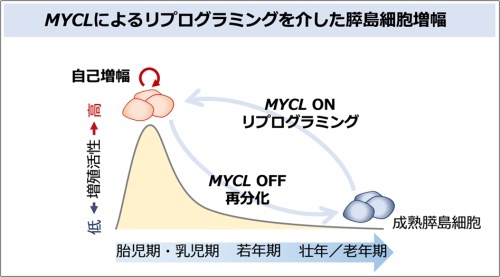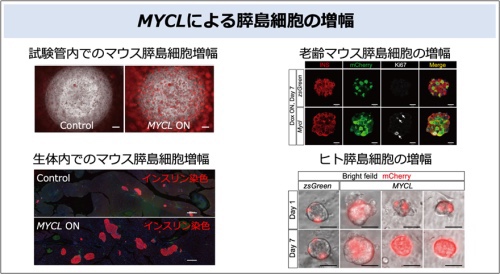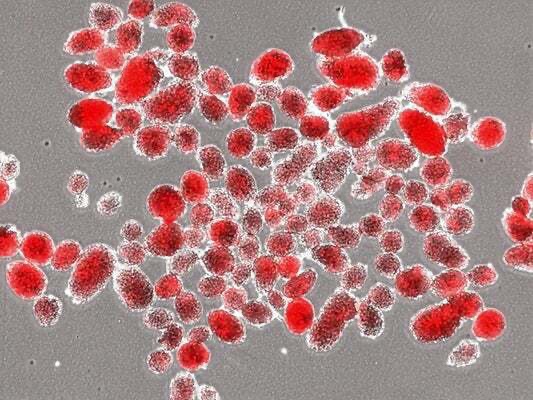


东京大学:开发一种增加胰腺中产生胰岛素的 β 细胞的方法:
-增加胰腺β细胞治疗糖尿病-
东京大学医学科学研究所:
治疗糖尿病
我们成功地“开发了一种新方法来增加胰腺中产生胰岛素的 β 细胞”。
东京大学医学研究所发表。
制造胰岛素的β细胞:
糖尿病是由胰腺分泌胰岛素不足引起的。
因为它在出生后不久就停止生长
即使胰岛素分泌受到干扰,也无法再生。
东京大学医学研究所
山田康弘教授
在使用鼠标的实验中,
他发现MYCL基因在出生前后都在胰腺中起作用,并参与了β细胞的增殖。
MYCL基因增殖β细胞:
通过激活MYCL基因
我们成功地增加了成年小鼠的胰腺和 β 细胞。
体外示范:
体外培养的β细胞,
通过移植到老鼠身上,
这意味着糖尿病的症状有所改善。
“癌症”的低风险:
使用MYCL增加β细胞的方法似乎是“癌变风险低”。
山田教授希望它能成为一种新的再生疗法。
该内容发表在科学杂志《自然代谢》上。
TBS新闻
https://news.tbs.co.jp/newseye/tbs_newseye6002310.html
MYCL-mediated reprogramming expands pancreatic insulin-producing cells |
Nature Metabolism
Abstract
β cells have a limited capacity for regeneration, which predisposes towards diabetes.
Here, we show that, of the MYC family members,
Mycl plays a key role in proliferation of pancreatic endocrine cells.Genetic ablation of Mycl
causes a reduction in the proliferation of pancreatic endocrine cells in neonatal mice.By contrast,
the expression of Myclin adult mice stimulates the proliferation of β and α cells, and the cells persist after withdrawal of Mycl expression.A subset of the expanded α cells give rise to insulin-producing cells after this withdrawal.
Transient Mycl expression in vivo
is sufficient to normalize the hyperglycaemia of diabetic mice.In vitro expression of Mycl similarly provokes active replication in islet cells, even in those from aged mice.
Finally,
we show that MYCL stimulates
the division of human adult cadaveric islet cells.Our results demonstrate that the induction of Mycl alone expands the functional β-cell population,
which may provide a regenerative strategy for β cells.
https://www.nature.com/articles/s42255-022-00530-y
Research: Diabetes symptoms improve in mice given proliferated pancreatic cells
Friday, Feb. 11,
A group of researchers says
it has improved the symptoms of diabetic mice through transplants of artificially proliferated cells that control blood sugar levels.Pancreatic islet cells
produce the hormone insulin, which regulates blood sugar levels.But the cells
have a limited capacity for regeneration, and the body cannot produce insulin once they stop working.This presents one of the challenges in treating diabetics.
The group, including Professor Yamada Yasuhiro of the University of Tokyo’s Institute of Medical Science,
succeeded in proliferating pancreatic islet cells by extracting them from mice and activating the MYCL gene.
The group found that
the blood sugar levels of diabetic mice dropped to almost normal after the multiplied cells were transplanted into them.They say they also confirmed that the activation of MYCL triggers the proliferation of human adult islet cells as well.
NHK WORLD-JAPAN News